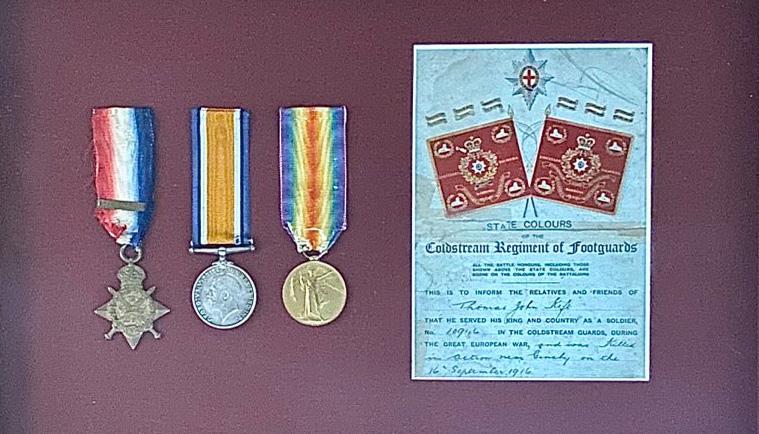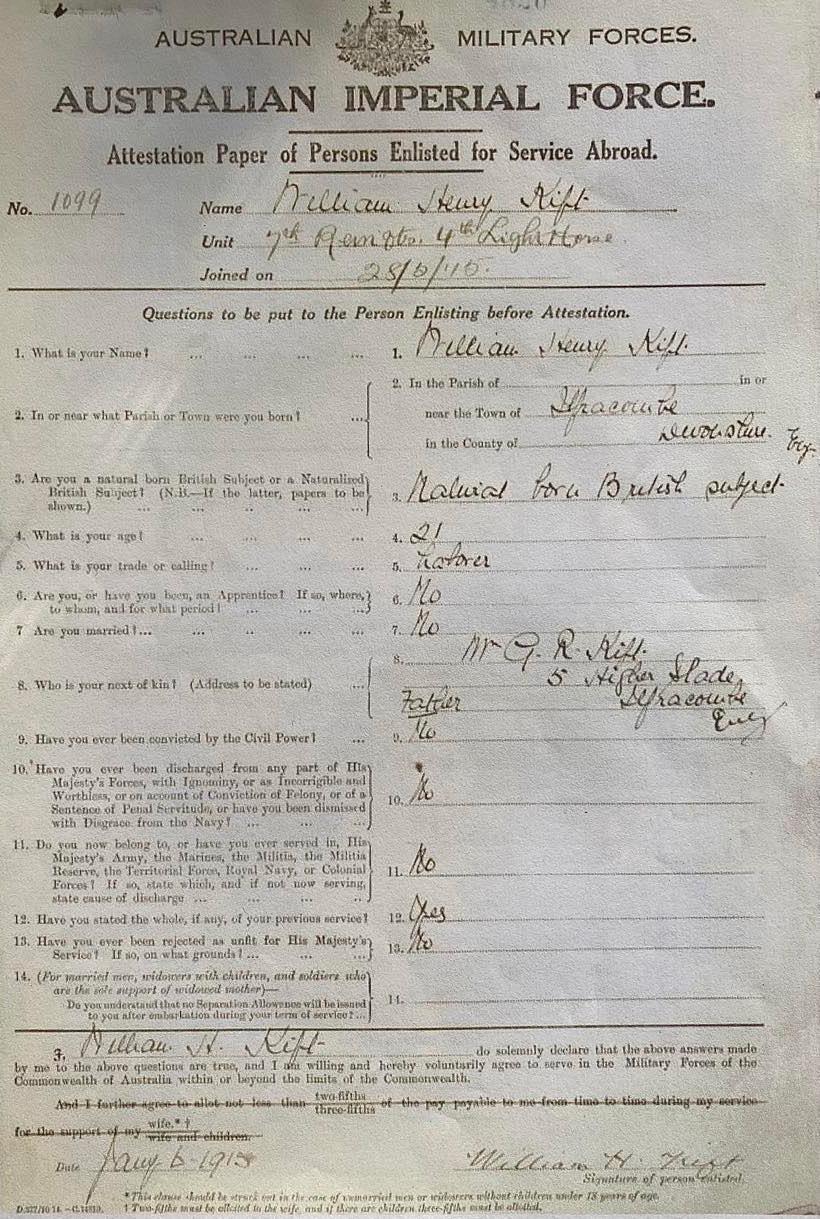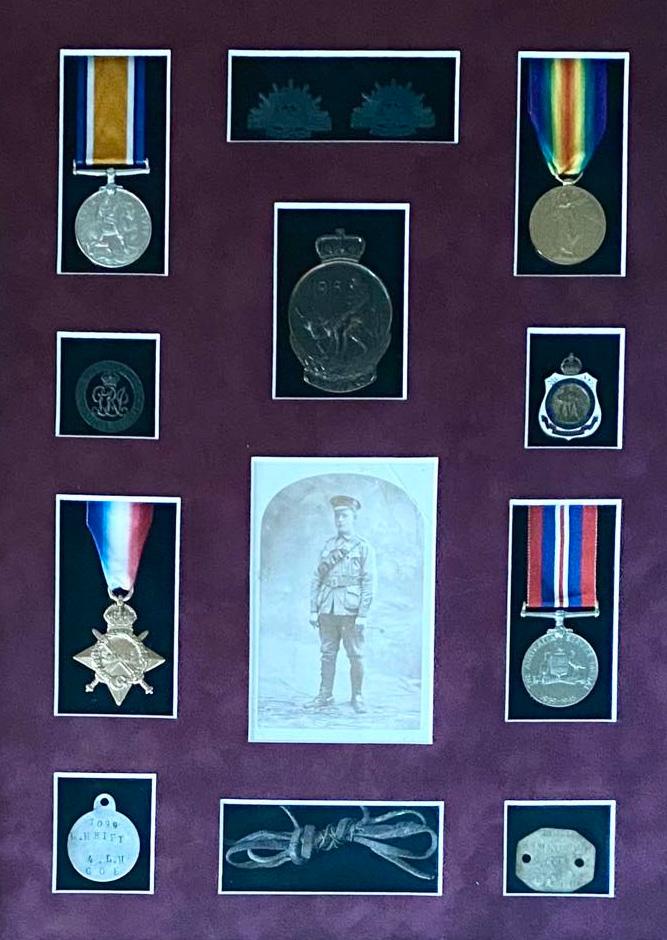
8 minute read
SERGEANT WILLIAM HENRY KIFT
1. GROWING UP (1894 - 1915) My late father-in-law’s life journey began on the 8th of June 1894, at a small seaside village named Ilfracombe, in Devon England. He came to Australia at the age of 16 years on a Church of England scheme to be billeted on a farm doing “farm hand “duties at Balnarring, near Somers Victoria. The name of the farm was “Warrawee” which still stands today ... It was a coach stop and had stables for the horses as well. There was a Post Office there... at one stage. William Henry loved his time there and was really part of the family- becoming very friendly with the Berryman daughters. (One of whom he married after returning from the WW1 war.)
2. ENLISTMENT AND WW1 (1915 - 1919)
William enlisted at Traralgon on the 13th of January 1915., and embarked Melbourne for the Middle East as a reinforcement group for the 4th Light Horse Regiment,4th Light Horse Brigade on the Royal Ship “Persia” on the 10th of August 1915. He disembarked in Egypt to camp “Heliopolis “. and was sent to Operations Gallipoli with the 4th Light Horse Regiment in October 1915. From there to El Kebir, Dec 1915., followed by Sinai, and Palestine, including the Charge of Beersheba. Oct. 1917, He embarked per transport “Berrima” 15th January 1919. - Suez. - To home. He was discharged medically on 25th May. 1919. Excerpts from my father in law’s personal diary are:

On Monday August 3rd he wrote “Sick of ordinary drill usual routine., so he is going to learn signaling ... --Most of the lads take a very keen interest in it” The next day they heard rumours of going away. On the 10th...-- Hope it is right... On Saturday the 8th he was allowed to go to Elsternwick to visit friends and went to a “picture show “at night. The following day he went back to camp at Seymour. with his “girlfriend” (future wife.) He wrote that on the Monday he was packing up to leave feeling quite excited. They left Melbourne pier at 3 p.m. --” SAID AU-REVOIR” and left. He states that the “Lads sang --- Goodbye Melbourne Town “That night it was his first experience in a hammock on a ship. He quite proudly states that the sea was rough, and a lot of the lads were sick, but not me!! and he was enjoying his food which was very good so far. My father-in-law had a sense of humour and writes that the sea must know that it is the Sabbath, because it is much calmer. They had a Church Service at 10-30 a.m., (as was the practice on Sundays.) and he enjoyed writing 6 letters to be posted at Fremantle when they got there. They stayed at Fremantle overnight, and he reports that when the ship was 50 miles out, the sea became very rough. They passed a steamer going to Fremantle --- Goodbye Aussie –he states. (So, in 1914 they were calling it Aussie.!)
They had fire and boat drills on the way to the tropics...-- and had a concert on board on the 20th of August – even though the sea was rough... But William enjoyed it... He always enjoyed a good “sing-along” and loved his music. They experienced the tropical weather, and one night he was sleeping on deck, and got flooded out, so had to go underneath. They commenced to have parades from here on, with full equipment and even a rifle drill. - on board a boat! On the 25th of August he wrote that it was very hot, and he wished that he was ADAM to wear only a fig leaf! At 4p.m. They crossed the line- presumably the Equator, and the usual practice of “dipping” was gone through with great success.” Got his annual “dip” but feelings still dry ...” No beer on board- worse luck” They arrived in Colombo on 26th August. They were given a musical reception by the Indian military. He says that the coconut plantations were a sight for sore eyes. On Monday 30th August he tells us that it was extremely hot. & they had to do full dress drill and he reckoned that he'll be a grease spot by Egypt. They had quite a few concerts, and drills in the coming weeks and even caught up with some lads off other ships. The sense of humour comes up again, because he says that after arriving from Suez, and getting on the train to Heliopolis- (a suburb of Cairo)!! they had some tea and went to “Bye Bye”
…. The boys were allowed a holiday the next day, and he travelled to Cairo, and was so impressed with the electric train “That it seemed that a country which still adheres to very ancient methods of cultivation etc. should possess one of the first electric railways in the world.”
He was disgusted with the “native quarters “of Egyptian peasants in Cairo, and said that they were a disgrace, squalid, and corruptible surroundings. They loaded their horses fodder and looked forward to receiving their horses a couple of days later. So that they were to adjust to horses, exercise them, & groom them. He reports that wounded men were being looked after in the hospital at the Heliopolis Palace- a most palatial place. He said that he spent a couple of days in hospital sick and talked to the blokes who had been at Gallipoli, but still felt cheerful, and felt that if more men would be available the peninsular would be ours. He also told that he visited Cairo after coming out of hospital and saw some back streets of Cairo...--- “Immorality everywhere.”. He visited the “Sphinx” and Pyramids and the Tombs of the Kings and Queens of Egypt. - He referred to them as a most marvelous piece of engineering. They were allowed to visit Cairo again but were warned to be ready at a moment’s notice to move. They visited the Egyptian Bazaars. They left the next morning for El Kebir. Thousands of troops were there. They embarked on the “Kalyan “for Lemnos Island and were not allowed lights after dark.
Boarded the gun boat “Partridge” for Gallipoli on the 23. /10/1915. They climbed the beach to deliver water to firing line ... The name of their trench was “Tasman's Post. “The very next day he wrote that they received their baptism of the firing line. Heavy shelling followed the next few days. Not only did they have to go into trenches, but they had to dig them also, and carry water to their other lads. He writes that one lad had an “incident” and started stabbing someone else’s coat in the night, but when they composed him, they laughed it off... ((Would be different today, and he would have therapeutic help) The very next day whilst William was asleep in his dug out, he writes” that a Turkish bomb came in to keep him company.” It buried itself in the ground near my head and a piece of stone or something hit me over the eye causing a SLIGHT wound and giving me a nice black eye. If the bomb had exploded it could have been the end of Poor Old Bill, “But thank God it did not.” A few days later he wrote that the SCRATC H was healing up., and he was on guard at the tunnel.
And he writes of the “TURKS” SLINGING A FEW BITS OF IRON ABOUT. He says that snow was on the ground, and it was extremely cold, and a “fellow can’t sleep” Left a few days for Lemnos Island and came across a cousin.!! They had to load a lot of food- bread, cheese, and Tin Billy’s “from Aussy ... here. Was so tired he forgot to salute a general and got roused up a treat.! They embarked on the “Caledonian” and had no idea where they were going to. They had Christmas Day on the water, and he remarked that they had NO PLUM PUDDING!! It must have been important to him! Another train trip to Heliopolis. after landing, & then to the lines where the horses were... He remarks that he got a “goody”! From the 28th they trained and got their saddlery and riding gear... (I still have his leather leggings.) They trained here and were with a large number of troops.the horses participated in the sport, and he very proudly states that their regiment had a good reputation for winning. In January 1917, they were made into a brigade., and they trekked through the desert calling and camping on many old battle fields finally reaching the front line in Palestine. They camped at Rafa. on the border of Sinai and Palestine. They experienced some German Bombs from aero planes here. They moved to a village named Khan Yunus and went inland from there to Tel-el-Tara which was the operating base for the Cavalry. A few weeks there and then back through Khan Yunnus where they spent a fortnight swimming the horses daily. Early in May 1917 they did a forced march of about 30 miles one night. with the object of helping the Anzac division and camel corps. The units had moved out to the south of Beersheba. They had the job of blowing up the 18 miles railway from Beersheba to Sinai. Their unit were to distract the Turks whilst the other party blew up the rail line. It proved a success. William was on signaling duty following Beersheba. They met up with their horses again, and he explains how the roads were slush, and sometimes up to the horses’ knees. They were able to get to the beach area and swim the horses themselves. Later they travelled through Gaza which he explains that an immense sacrifice was made trying to capture the Turkish strong hold. They proceeded to Desi El Belah where they were for 2-3 months. Following this, they went to a village near Jaffa - called Selmieh and hence to the Jordan Valley He says that the steep hill, when looking back showed the line of horses zig zagging down the hill from Jerusalem like a giant snake... Very hard to ride in those conditions, and brilliant horses managed it. They passed through here mid-April. 1918. The brigade proceeded to Jericho -1000 feet below sea level. The hills were destitute of vegetation. They He was sent to hospital and then to Cairo. He returned to the Unit again on the 29th of July, where he started feeling sick again. In a few days’ time. ... Sent to hospital after 2 weeks. ... and was there until the end of October. (3 months.) He once more returned to work in the signal’s office in Moascar Had to return to hospital again, and there over Christmas Day... The nurses keep all patients happy and fed. In January 1919 he returned to duty at Signal Headquarters, but he was told that he was going to be sent back to Aussy. He hopes he will get through. About a week later, he refers to the fact“: Dinkum oil “at last.
3. HOMECOMING He left Ismailia per hospital train and arrived at Suez and embarked on the hospital ship”Berrima “ where there were a shipfull of men from France.. He tells of a Chruch service on the boat on Sunday. They berthed at Colombo on the return voyage. He disembarked to the “Hygeia “– along with others saying he was quivering with excitement as they were nearing Port Melbourne pier. The Band played them in ...-- Playing “Home once more.”. The final words in his diary are... I must call it home, for I like it so much... William married Elsie Berryman and they had 4 children Elizabeth (Bette), Ken, Jean, and John. William’s career was at the Law Courts, -Melbourne, - Wonthaggi, and at Sale. ...
4. ENLISTING FOR A SECOND TIME When World War 2 broke out, he registered for service again, and was in the 13 Volunteer Defence Corps at Sale... The family home at Foster Street Sale was home to many airmen who visited for a meal and were extended the family “contact” evenings of laughter and song.
5. AFTER THE WARS William did not talk of his experiences at war to his family, and it was only when his diary was found that we all were able to understand. He died at 59 years of age... his youngest child being 15 years of age.












